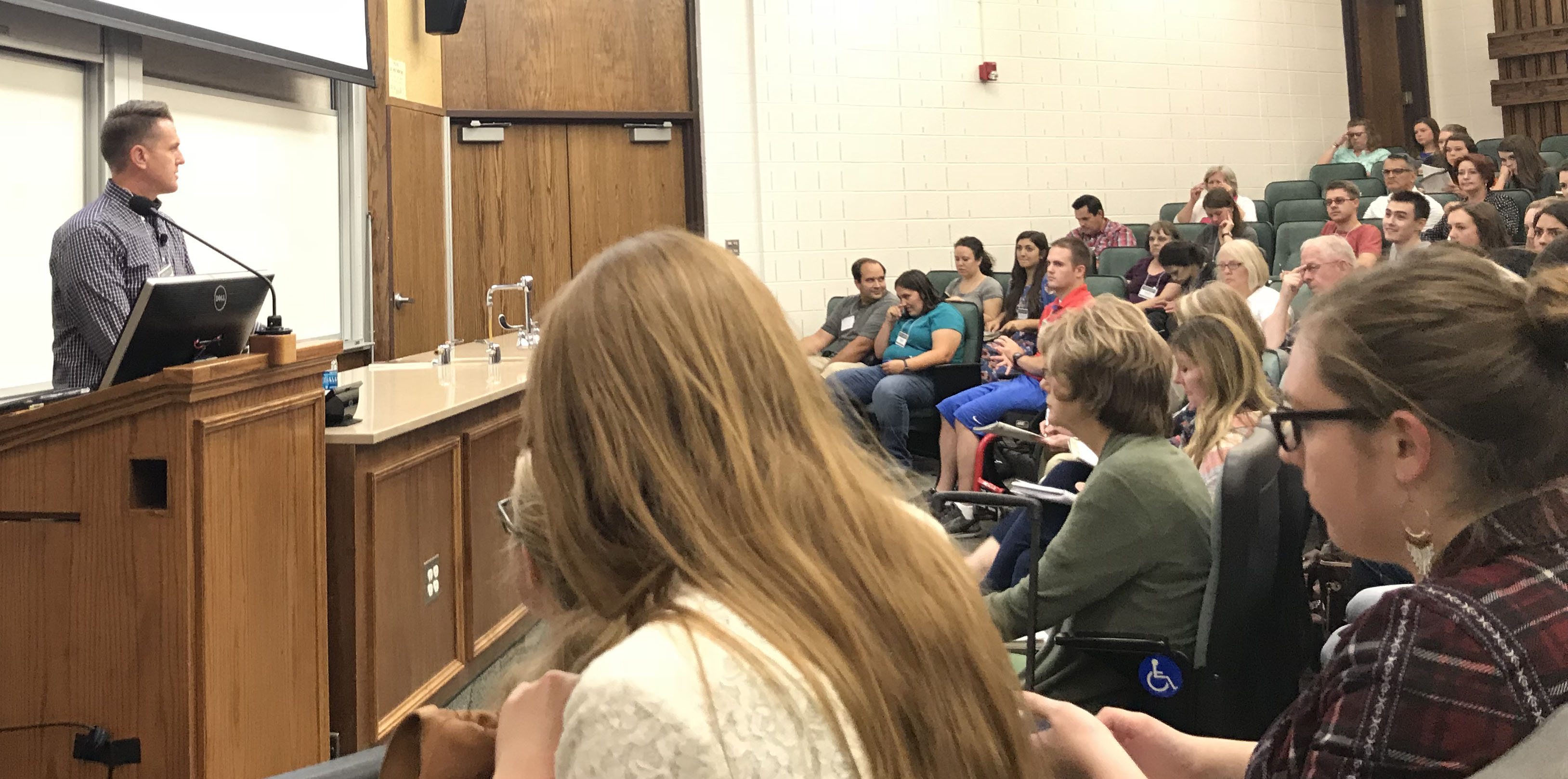
The three things a person takes with them after this life are their soul, their intelligence and their relationships.
That means the marriage relationship “deserves our very best freaking out about,” Scott R. Braithwaite said.
But not in a pop song, Hollywood, soul mate sort of way.
Braithwaite said the fact that a person chooses for themselves whom they marry makes marriage “much more romantic” than that because the person has evaluated the proposition and has chosen for themselves.
“I choose you. And I will continue to choose you every day for the rest of my life and for eternity,” Braithwaite said. “I think we have a much more romantic way of thinking about it.”
Braithwaite brought his skills as a BYU associate professor of psychology and associate director of Clinical Training into his discussion about marriage and relationships.
“The marriage covenant is critical,” Braithwaite said. “These Latter-day Saint doctrines inform me where I ought to put my priorities.”
Referencing the scriptures, Braithwaite mentioned how the “language of cleaving” is only used in connection with one’s relationship with their spouse and with God.
The plan of salvation teaches that the family is the basic unit of eternity, and Braithwaite said that the most important part of that unit is the couple.
“Because marriage is so central to the plan, you see that marriage is so central to life,” Braithwaite said.
Braithwaite took this idea further when he said relationships are part of how people return to heaven and therefore deepening and nurturing relationships are important because of their eternal nature.
So, who decides whom we marry?
Braithwaite started this section by asking listeners: “Do you have a soul mate?”
A few quiet “no” responses and some mumbling among the listeners followed this question.
To help, Braithwaite quoted President Boyd K. Packer when he said, “While I am sure some young couples have some special guidance in getting together, I do not believe in predestined love. If you desire the inspiration of the Lord in this crucial decision, you must live the standards of the Church, and you must pray constantly for the wisdom to recognize those qualities upon which a successful union may be based. You must do the choosing, rather than to seek for some one-and-only so-called soul mate, chosen for you by someone else and waiting for you.”
Braithwaite said this idea of soul mates is a “twisted, tortured logic” that makes people think that if things are wrong, then they must have chosen the wrong person, or even that they can say, “Well, I didn’t choose this person, I just went to the temple.”
If love is only thought of as a feeling, people are really going to get in trouble, according to Braithwaite.
“‘Soul mates’ are fiction and an illusion,” Braithwaite said, quoting President Spencer W. Kimball. “It is certain that almost any good man and any good woman can have happiness and a successful marriage if both are willing to pay the price.”
Dating and partner selection
During this section of his lecture, Braithwaite talked about two different extremes people adopt in decision making learned from Elder Glen Pace. One side is that they neglect the gift of the Holy Ghost completely and rely on purely rational thought. The other side is that they pray for the answer and “canonize the first thought that comes to mind.”
This is embodied in dating culture today, according to Braithwaite, when a person thinks they can “pray (their) way” to their spouse and when they actually start dating someone, they don’t have to talk to them or listen to them. They can simply ask Heavenly Father if it’s the right person.
“We sort of turn of the part of our brain that makes choices,” Braithwaite said.
This thought process creates a shopping mentality, can make people become shallow, and is “antithetically opposed” to forming good relationships, according to Braithwaite.
These thoughts make it harder to find someone because people are looking for perfection. Braithwaite said people start thinking their marriage will work as long as they’ve found their soul mate, and if problems arise, then that person must not be him or her.
This mentality is not a good approach to marriage, according to Braithwaite.
“You have to try to make your marriage work. You can’t just assume that is it going to work,” Braithwaite said.
It is a mistake if people think they can focus on all other aspects of Latter-day Saint doctrine, while not focusing on their marriage and think that their marriage will just work, according to Braithwaite.
“Revelation is 95 percent hard work,” Braithwaite said, quoting Elder Glen Pace.
Braithwaite then asked his listeners how they do that work.
“Sounds crazy, but I think you should date,” Braithwaite said.
He encouraged listeners to return to the pattern of dating, not remain in the “team-sport approach” of hanging out, and to be brave and ask someone out. He referenced his experience of getting “rejected like seven times” from his now wife.
He also reminded listeners that in serious dating it is important to remain open to things they may not want to see.
“Serious dating isn’t a lot like regular life,” Braithwaite said. “I think what you need to focus on is deeds, not words.”
His final piece of advice was to use four things: one’s head, heart, gut, and people.
The head is the part that thinks; the heart will pull one in certain directions; the gut is connected to intuition, which Braithwaite encourages listeners not to ignore; one’s people are those who know and love them best.
Braithwaite said a balance in each of these four areas will help people as they decide whom to marry.




